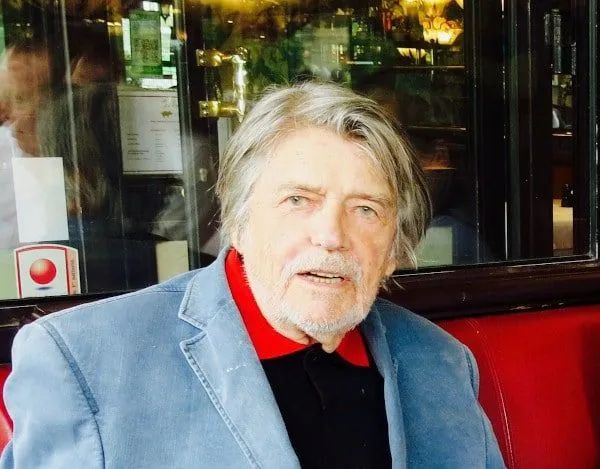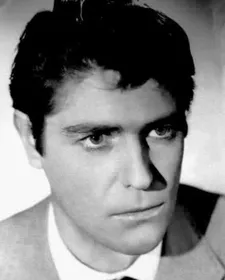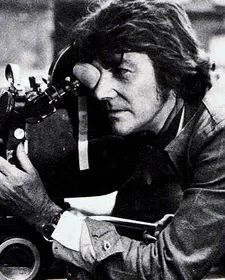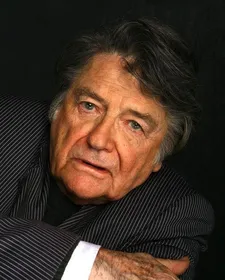 |
| Jean-Pierre Mocky , who was honoured by the French Film Festival UK in 2016 Photo: Richard Mowe |
 |
| A young Mocky who worked with Jean Cocteau in 1949 as the poet in Orphan Photo: Unifrance |
One of France’s most renegade, colourful and unclassifiable filmmakers Jean-Pierre Mocky has died in Paris at the age of 90, it has been announced by his family.
He was the director of more than 60 films, notably The Big Wash (La Grande Lessive), Heaven Sent (Un Drôle De Paroissien), Le Miraculé, A Mort l’Arbitre and Y a-t-il Un Français Dans La Salle?.
He was a man of many parts. In the 1940s he was a celebrated theatre and film star probably best-known for his performance in Jean Cocteau's Orpheus (1950).
Mocky began his directorial career with the 1959 release, The Chasers, and has subsequently turned out loosely constructed features noted for their broad black humour and cynicism. Although he is in some sense a kindred spirit to the directors of the New Wave, Mocky is rarely associated with that movement by critics or public.
From his office on the Quai Voltaire he used to run his “empire”, which included two Parisian cinemas The Desperado (previously known as Action Ecoles) on the Left Bank and the Brady on the right bank. With his friend Gérard Depardieu he was in the process of buying some more cinemas so he could establish a circuit for films that might not normally be widely seen. Over a career of more than 50 years he has turned out at least one film a year.
 |
| Moky behind the camera on one of the more than 60 films he directed Photo: Unifrance |
At the time of the Liberation he settled in Paris, but returned to the Côte d'Azur and worked as a beach orderly for the Carlton Hotel in Cannes. In 1942, he was an extra in Marcel Carné’s Les Visiteurs Du Soir alongside Simone Signoret and Mouloudji. He took acting classes with Henri Rollan and Louis Jouvet, after which, at the tender age of 18, he found himself playing in productions of plays by Feydeau and Cocteau.
After finding time to study law while still taking the odd small role on stage, Mocky became noticed by Pierre Fresnay, who hired him for the role of Hippolyte in a modern version of Phaedra. He returned to his acting lessons and discovered his contemporaries were Jean Rochefort, Jean-Pierre Marielle et Jean-Paul Belmondo. His first role in the cinema was as the poet in Jean Cocteau’s Orphan in 1949. This restless spirit decided to try his luck in Italy, where he was an assistant to Federico Fellini on La Strada and with Luchino Visconti for Senso and managed to make a living as an actor for hire.
 |
| Jean-Pierre Mocky in his eighties … had his own production company and ran Parisian cinemas Photo: Unifrance |
Nothing daunted Mocky, who decided to set up his own production company Balzac Films, which had two small studios in the street of the same name. At the time he was living with Véronique Nordey, whom he had met when she played in Head Against The Wall. She helped with his productions and they were together for more than 16 years, producing a son Stanislas Nordey who later went on to follow in his father’s wake as a theatre director.
The success of Les Dragueurs - known as Young Have No Morals in English - prompted Mocky to make Un Couple, about the vicissitudes of the passing years on the course of love. He showed a lighter touch with Snobs, about duplicity and vanity. He worked with the late, great Bourvil on Heaven Sent and The Big Scare (La Cité De l’Indicible Peur). Mocky proved himself adept at chronicling the moral mood of the times, frankly confronting sexuality and the power of wealth.
He had a complicated romantic life and was married for the first time at the age of 17 to Monique Baudin, who had become pregnant. Perhaps predictably, the union lasted only three months. He was wed four times, and had at least five children. He showed no signs of wanting to put the lens cover on his career for good or indeed neglecting his acting prowess and insisted on appearing via Skype from his home in Paris for focus on his work as part of the French Film Festival UK in 2016.
Some Key Dates
1994: He bought Le Brady cinema in Paris, ensuring he had at least one screen to show his films.
2001: He published his memoirs: M le Mocky
2004: He began work on his complete works on DVD
2007: Teaming up with Tom Novembre, Thierry Frémont, Bruno Solo and Nancy Tate, he adapted the American best-seller by Gil Brewer, turning it into a dark love story 13 French Street.
2008: He started his first TV series in the style of Hitchcock, Mister Mocky Presents.
2009: Jean Pierre Mocky received the Prix humour de résistance for his collected works.
2010: He shot Les Insomniaques and was awarded the Prix Henri-Langlois for his body of work which covers all aspects of The Seventh Art, including actor, director, scriptwriter, cinema owner, procure and distributor.
2016: French Film Festival UK honoured Jean-Pierre Mocky - and he appeared via Skype.





















